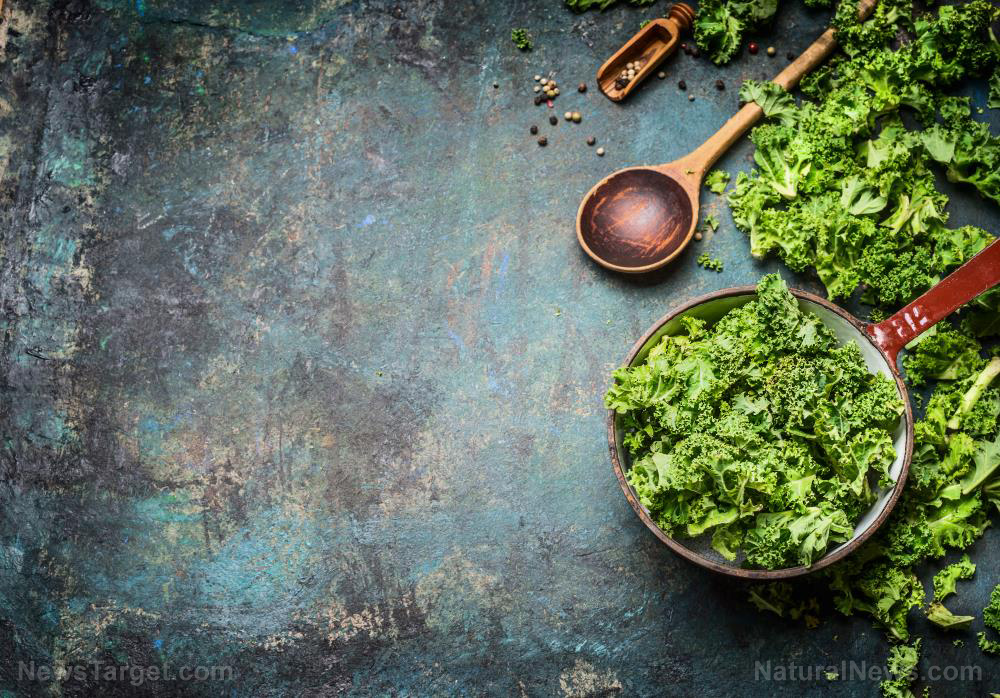 Parler
Parler Gab
Gab
Kale contains bioactive proteins that stimulate immune function
Although kale may not be your favorite vegetable because of its bitter flavor, there are many reasons why you shouldn't snub this chewy leafy green. For one, kale is a rich source of fiber, which is good for your digestive system. It also contains high amounts of protein -- about 14 percent more than spinach, in fact -- whose building blocks, the amino acids, are needed by your body to produce its own proteins. Kale is also packed with vitamins A and K, which you need to maintain good eyesight and strong bones, respectively. Based on nutritional analysis, a one-cup serving of kale (21 grams, g) is enough to give you decent amounts of the antioxidants lutein and zeaxanthin, the vitamin A precursor beta-carotene and a whopping 68 percent of the Daily Value (DV) for vitamin K. The same serving size can also give you 22 percent of the DV for vitamin C, which is twice more than spinach can give you. As you may have already heard, vitamin C is a big help to your immune system. Studies show that this essential nutrient boosts your immune defenses by supporting the functions of various immune cells. These cells include those that respond immediately to the presence of pathogens, as well as those directly involved in helping you build long-lasting immunity. Vitamin C also helps strengthen your skin's natural barrier, which serves as your first line of defense against harmful invaders. Given these functions, it's not surprising that vitamin C-rich foods like kale are said to be the best ones to eat for enhancing immunity. But kale doesn't have just vitamin C to thank for its good reputation. According to a 2011 study by Japanese researchers, kale also owes its immune-supporting abilities to bioactive proteins. One of these proteins is believed to be rubisco, a known immunostimulant that's also found in spinach. Rubisco is a key enzyme in photosynthesis that also stimulates antibody production in animal B cells. But based on their experiments, the Japanese researchers found that rubisco in kale extract isn't working alone. Rubisco's immune-stimulating activity is actually enhanced by another kale protein, one that hasn't been yet identified. Together, these two proteins work synergistically to improve the immune system's ability to fight infections or diseases by promoting the production of antibodies.Some of kale's immune-boosting compounds can also fight cancer
In the last decade, thanks to increasing interest in the medicinal potential of foods, cruciferous vegetables like broccoli, cabbage and kale have gained popularity. Studies have found that this family of leafy greens contains powerful compounds that can fight cancer. These compounds became known as glucosinolates. Glucosinolates are a large group of sulfur-containing compounds that can only be found in plants belonging to the Brassica genus. They are said to have antibacterial, antifungal and antiviral properties and are responsible for the bitter taste and pungent aroma of vegetables like broccoli, Brussels sprouts and kale. When you eat these vegetables, the glucosinolates in them are processed by your body into indoles and isothiocyanates. Studies show that these compounds are the ones responsible for the anti-cancer effects attributed to Brassica vegetables. According to a 2019 study, isothiocyanates can help lower your cancer risk by supporting your body's natural detox abilities and reducing inflammation, among other things. Researchers have also found that isothiocyanates can stop cancer from spreading by disrupting the cell cycle. The cell cycle is a series of events that occur inside a cell as it grows and divides. By halting this crucial process, isothiocyanates can kill cancer cells by causing them to commit cell suicide (apoptosis). An earlier study by Taiwanese researchers also revealed that, like vitamin C, isothiocyanates have immune-boosting effects. They reported that, following treatment in mice injected with leukemia cells, an isothiocyanate called phenethyl isothiocyanate stimulated a strong immune response against cancer cells. The compound did so by promoting the activity of relevant immune cells. Thanks to these remarkable anti-cancer activities, experts now look at isothiocyanate sources like kale and other Brassica vegetables as promising chemotherapeutic agents. You can lower your risk of cancer naturally and effectively by taking advantage of the beneficial properties of kale and similar superfoods, and including them in your daily diet. Sources: BostonMagazine.com ExtraVegetables.com MasterClass.com NutritionValue.org MDPI.com 1 MDPI.com 2 Academic.OUP.com VeryWellFit.com NaturalHealth365.com Genome.gov OnlineLibrary.Wiley.comSupplementing with vitamin D found to improve blood pressure in overweight children
By Zoey Sky // Share
Common signs and symptoms of magnesium deficiency
By Olivia Cook // Share
Food supply 101: How to grow edible mushrooms in your home garden
By Zoey Sky // Share
Qatari study finds natural immunity is 97% EFFECTIVE against severe COVID even after 14 months
By Ramon Tomey // Share
Nearly 100 hospitalized following consumption of Daily Harvest vegan product
By Belle Carter // Share





